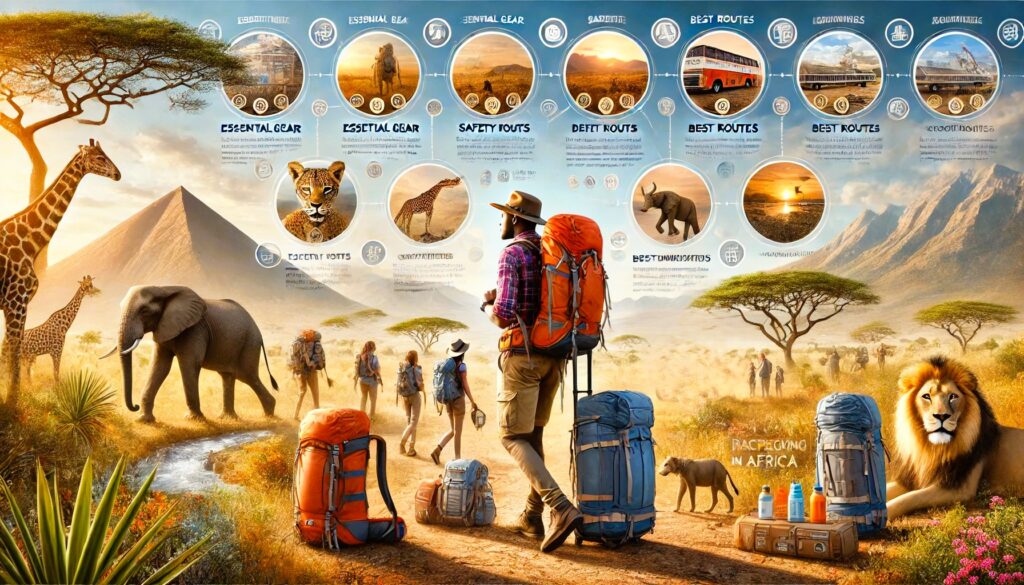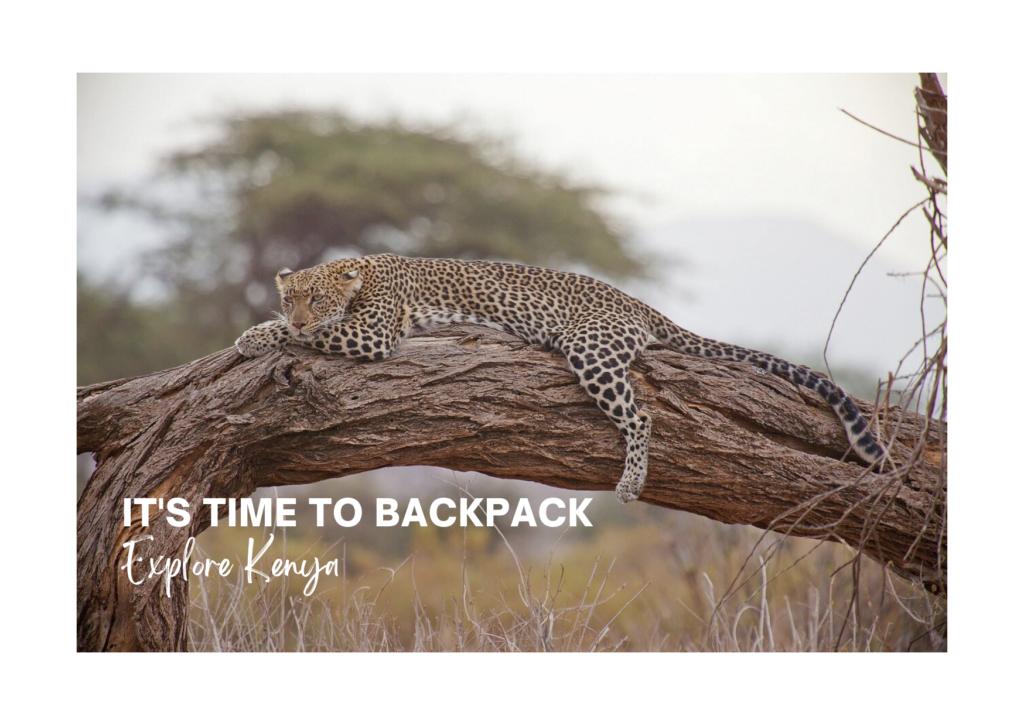
Backpacking Africa Trip:
Backpacking Africa is a unique and thrilling experience that offers diverse cultures, stunning landscapes, and unforgettable adventures. From the deserts of Namibia to the beaches of Zanzibar, Africa provides endless opportunities for exploration. This comprehensive guide covers everything you need to know to prepare for your backpacking journey across this incredible continent.
Choosing Your Destinations: Popular Backpacking Routes in Africa
East Africa – A Top Backpacking Africa Hub
Kenya
Kenya is a quintessential African destination known for its diverse landscapes and incredible wildlife. The Maasai Mara National Reserve is world-famous for the Great Migration, where millions of wildebeest, zebras, and gazelles traverse the plains. Nairobi, the bustling capital, offers a mix of modernity and tradition, with attractions like the David Sheldrick Wildlife Trust and the Karen Blixen Museum. Coastal areas such as Mombasa and Diani Beach provide stunning beaches and rich Swahili culture. You can book a backpacking room in Nairobi here.
Tanzania
Tanzania boasts some of Africa’s most iconic landmarks, including Mount Kilimanjaro, the highest peak on the continent. The Serengeti National Park is renowned for its vast savannahs and abundant wildlife, making it a prime safari destination. Zanzibar, an archipelago off the coast, offers pristine beaches, historic Stone Town, and a unique blend of African, Arab, and European influences. For cultural experiences, visit the local tribes like the Maasai and the Hadzabe.
Uganda
Uganda, known as the “Pearl of Africa,” offers diverse experiences ranging from wildlife safaris to mountain trekking. Bwindi Impenetrable National Park is famous for its mountain gorillas, providing a rare opportunity for gorilla trekking. Murchison Falls National Park and Queen Elizabeth National Park offer excellent wildlife viewing. The capital city, Kampala, is vibrant and bustling, with a lively nightlife and rich cultural heritage.
Rwanda
Rwanda is a small yet remarkable country known for its breath-taking landscapes and wildlife conservation efforts. Volcanoes National Park is home to mountain gorillas and golden monkeys, making it a top destination for primate enthusiasts. Kigali, the capital, is clean and safe, with significant sites like the Kigali Genocide Memorial. Lake Kivu offers serene waters and beautiful scenery, perfect for relaxation and water activities.
Southern Africa
South Africa
South Africa is a diverse and dynamic country with something for every traveler. Cape Town is renowned for its stunning Table Mountain, vibrant waterfront, and historical Robben Island. The Garden Route offers scenic drives and outdoor adventures. Kruger National Park is one of the best places in Africa to see the Big Five. Johannesburg, the largest city, is rich in history and culture, with attractions like the Apartheid Museum and Soweto.
Namibia
Namibia is known for its stark, dramatic landscapes. The Namib Desert, with its towering red dunes at Sossusvlei, is a photographer’s paradise. Etosha National Park offers excellent wildlife viewing, while the Skeleton Coast provides rugged coastal beauty. For adventure seekers, Damaraland and the Fish River Canyon offer incredible hiking and exploration opportunities. Windhoek, the capital, is a blend of African and German influences.
Botswana
Botswana is a premier safari destination known for its commitment to wildlife conservation. The Okavango Delta, a UNESCO World Heritage Site, is a vast inland delta teeming with wildlife. Chobe National Park is famous for its large elephant herds. The Makgadikgadi Pans, one of the world’s largest salt flats, offers unique landscapes and a sense of vastness. The capital, Gaborone, is a growing city with modern amenities and cultural attractions.
Zimbabwe
Zimbabwe offers a rich history and spectacular natural wonders. Victoria Falls, one of the Seven Natural Wonders of the World, is a must-see. Hwange National Park is home to a diverse range of wildlife. The Great Zimbabwe Ruins provide a glimpse into the country’s ancient civilization. Harare, the capital, offers vibrant markets, museums, and gardens. The Eastern Highlands and Lake Kariba offer beautiful scenery and outdoor activities.
West Africa
Ghana
Ghana is known for its rich cultural heritage and welcoming people. The capital, Accra, is vibrant and bustling, with attractions like the Kwame Nkrumah Memorial Park and the bustling Makola Market. Cape Coast and Elmina are home to historic slave castles that tell a poignant story of the transatlantic slave trade. The Ashanti Region, with its capital Kumasi, is a cultural hub, showcasing the traditions of the Ashanti people.
Senegal
Senegal offers a blend of African and French influences. Dakar, the capital, is a lively city known for its music, nightlife, and historic sites like the House of Slaves on Gorée Island. Saint-Louis, a UNESCO World Heritage Site, boasts colonial architecture and a rich cultural history. The Pink Lake (Lake Retba) is famous for its unique color and high salt content. The Casamance region in the south offers lush landscapes and vibrant cultures.
Nigeria
Nigeria is the most populous country in Africa, offering a vibrant cultural scene and bustling cities. Lagos, the largest city, is known for its music, nightlife, and thriving arts scene. Abuja, the capital, is modern and well-planned, with attractions like the Zuma Rock and Millennium Park. The ancient city of Kano offers a glimpse into Nigeria’s rich history and culture. The Niger Delta and Cross River National Park showcase Nigeria’s natural beauty.
North Africa
Morocco
Morocco is a country of contrasts, with ancient cities, stunning deserts, and beautiful coastlines. Marrakech is famous for its medinas, souks, and historical sites like the Koutoubia Mosque and the Saadian Tombs. Fes, another imperial city, boasts one of the oldest universities in the world and a bustling medina. The Sahara Desert offers opportunities for camel treks and star-gazing. Coastal cities like Essaouira and Agadir offer beautiful beaches and relaxed vibes.
Egypt
Egypt is renowned for its ancient civilization and iconic landmarks. Cairo, the capital, is home to the Pyramids of Giza, the Sphinx, and the Egyptian Museum. Luxor and Aswan are gateways to the temples and tombs of the Pharaohs, including the Valley of the Kings. A Nile River cruise offers a unique way to explore these historic sites. The Red Sea resorts, such as Sharm El Sheikh and Hurghada, are popular for diving and relaxation.
Tunisia
Tunisia offers a rich blend of history, culture, and natural beauty. The capital, Tunis, boasts the ancient medina and the Bardo Museum, home to one of the world’s finest collections of Roman mosaics. Carthage, near Tunis, offers fascinating ruins from the Punic and Roman periods. The Sahara Desert in the south provides stunning landscapes and opportunities for desert excursions. Coastal cities like Sousse and Hammamet offer beautiful beaches and vibrant nightlife.
Visa Requirements
Research visa requirements for each country you plan to visit. Many African countries offer eVisas or visas on arrival, but it’s essential to check specific requirements in advance to avoid any issues at the border.
Budgeting for Your Trip
Daily Expenses
- Accommodation: Budget hostels and guesthouses range from $10 to $30 per night. A place like Dorchester Inn Backpacking guesthouse offers private accommodation which is safer and secure for as little as $25 per night/per double room. So you could be sharing the room with your travelling backpacking partner. This means amazing savings.
- Food: Street food and local eateries can cost $5 to $15 per day.
- Transportation: Public transport and shared taxis are economical options, costing $5 to $20 per day.
- Activities: Safaris, treks, and cultural tours can range from $20 to $200 depending on the experience.
Travel Insurance
Invest in comprehensive travel insurance that covers medical emergencies, trip cancellations, and theft. Ensure it includes coverage for adventure activities like trekking and diving. This is a must when Backpacking Africa.
Packing Essentials
Clothing and Footwear
Versatile and Lightweight Clothing
- Quick-Dry Fabrics: Essential for varying climates and activities.
- Layering Options: Include lightweight layers for hot days and warmer layers for cool evenings.
- Modest Clothing: Respect local customs, especially in conservative areas.
Footwear
- Hiking Boots: Sturdy and comfortable for treks and safaris.
- Sandals: Lightweight and breathable for everyday wear.
- Flip-Flops: Useful for beach days and communal showers.
Travel Gear
Backpack
- Size and Capacity: 50-70 litres is ideal for extended trips.
- Comfort and Fit: Look for adjustable straps, a padded hip belt, and a ventilated back panel.
Accessories
- Daypack: For day trips and excursions.
- Reusable Water Bottle: Preferably with a built-in filter.
- Travel Towel: Lightweight and quick-drying.
- Headlamp: Essential for navigating in low light.
Health and Safety
First Aid Kit
Include bandages, antiseptic wipes, painkillers, and any prescription medications. Also, pack a basic medical guide and emergency contact information.
Insect Repellent and Sunscreen
Protect against mosquito bites and the intense African sun. Choose products with DEET for repellent and high SPF for sunscreen.
Navigating Africa while Backpacking Africa
Transportation Options
Public Transport
- Buses and Matatus: Widely used and economical for intercity travel. Can be crowded and chaotic but offer a local experience.
- Trains: Available in some regions like Kenya and South Africa. Comfortable for long-distance travel.
Ride-Sharing and Taxis
- Uber and Local Apps: Available in major cities. Convenient and often safer than hailing street taxis.
- Shared Taxis: Cost-effective for short distances. Agree on a fare before starting your journey.
Accommodation
Budget-Friendly Options
- Hostels and Guesthouses: Provide affordable lodging and opportunities to meet fellow travelers.
- Camping: Available in national parks and some urban areas. Ensure you have the necessary gear.
Booking in Advance
Reserve accommodation in advance, especially during peak travel seasons, to secure a spot and potentially get better rates. Plan as much in advance for your Backpacking Africa trip.
Experiencing Local Culture
Language and Communication
Learning Basic Phrases
- Swahili: Common in East Africa. Phrases like “Jambo” (Hello) and “Asante” (Thank you) are helpful.
- French: Widely spoken in West and Central Africa. Knowing basic French can enhance your interactions.
Connectivity
- SIM Cards: Purchase local SIM cards for affordable data and calling rates.
- Wi-Fi: Available in urban areas and hotels. Less reliable in remote locations.
Food and Dining
Local Cuisine
- Kenya: Try dishes like ugali, nyama choma, and sukuma wiki.
- Morocco: Sample tagine, couscous, and mint tea.
- Ghana: Enjoy jollof rice, kelewele, and banku.
Eating Safely
- Street Food: Delicious and cheap, but choose vendors with high turnover to ensure freshness.
- Hydration: Drink bottled or filtered water to avoid waterborne illnesses.
Staying Safe
Health Precautions
Vaccinations and Medications
Ensure you are up-to-date on routine vaccines. Consider additional vaccinations like Yellow Fever, Hepatitis A and B, and Typhoid. Carry anti-malarial medication if traveling to high-risk areas.
Travel Clinics
Research local travel clinics in advance for any medical needs. Know the location of the nearest medical facility at all times.
Personal Safety
Staying Alert
- Avoid Walking Alone at Night: Especially in unfamiliar areas.
- Secure Your Belongings: Use a money belt or hidden pouch for valuables. Keep your backpack locked.
Respecting Local Customs
- Dress Modestly: Especially in conservative regions.
- Ask Permission Before Taking Photos: Respect the privacy and customs of locals.
Top Destinations and Activities for Backpacking Africa
Wildlife and Nature
Safaris
- Maasai Mara (Kenya): Known for the Great Migration and abundant wildlife.
- Kruger National Park (South Africa): Offers diverse wildlife and well-maintained facilities.
Natural Wonders
- Victoria Falls (Zambia/Zimbabwe): One of the largest and most famous waterfalls in the world.
- Mount Kilimanjaro (Tanzania): The highest peak in Africa, offering challenging and rewarding treks.
Cultural and Historical Sites
Historic Cities
- Marrakech (Morocco): Famous for its medinas, souks, and historical sites.
- Cape Town (South Africa): Known for its history, Table Mountain, and vibrant culture.
Traditional Villages
- Maasai Villages (Kenya/Tanzania): Experience the culture and lifestyle of the Maasai people.
- Dogon Country (Mali): Explore the unique architecture and culture of the Dogon people.
Conclusion on Backpacking Africa
Backpacking Africa offers an unparalleled adventure filled with diverse experiences, from stunning landscapes and rich wildlife to vibrant cultures and historical sites. By planning carefully, packing wisely, and staying informed about health and safety, you can ensure a safe and memorable journey. Embrace the adventure, connect with locals, and create lifelong memories on your African backpacking trip. Happy travels!
We hope you enjoyed this article about Backpacking Africa: Everything You Need to Know. You may also like to read more on Backpacking Checklist for Africa.
If you liked this article, then please subscribe to our YouTube Channel for entertaining videos and more. You can also find us on Facebook, Instagram, TikTok, Pinterest and X (Twitter).


